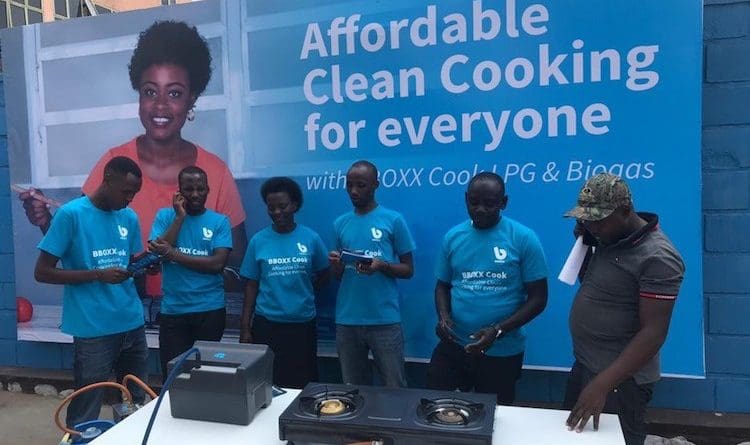Rwanda: New Initiative Helps Tackling Clean Cooking Crisis
By IDN
By Kizito Makoye
At a bustling neighbourhood, nestled on the rolling hills of Nyamirambo, southwest of the Rwandan capital city, Kigali every woman has a story to tell about a smart cooker and how it has removed hardship when someone is preparing a meal.
“It’s such a good stove, it doesn’t emit smoke, it is easy to use and saves a lot of cooking time,” says Lydia Kashozi, a resident of Nyamirambo
The 39-year-old mother of four, recently bought a 15kg gas cylinder for Rwf13,500 ($14), and is expected to pay additional Rwf 9,000 ($9.7) in the next six months to permanently own the cooker and its assortments.
Kashozi is among many Kigali residents, who have switched to smart cooking using Liquified Petroleum Gas(LPG) as part of an initiative by a London-based BBOXX, which combines pay-as-you-go solar energy with clean cookers to tackle biomass cooking crisis.
About 65 per cent of Rwanda’s urban households, still use firewood and charcoal for cooking, which pose a serious heath threat and increase random tree felling, according to the country’s Land and Forestry Ministry.
The landlocked nation has, however, embarked on an ambitious campaign to curb the use of biomass fuel for cooking by planting more trees and promote the use of clean sources of energy.
“I don’t use charcoal for cooking anymore, they’re just too costly and emit bad smoke,” says Kashozi.
The clean cooking crisis is particularly acute in sub-Sahara Africa where approximately 86% of the population lives without clean fuels and better cooking technologies – thus many people die each year of smoke-related diseases.
BBOXX cook system, is a smart device with a battery connected to a gas cylinder, and a mechanism to monitor and notify customers about the remaining gas and how much it costs.
With mobile money payment system, the customer can buy gas for as less as Rwf 500 depending on his pocket.
“This is an exciting step for us… the technology that we have used to provide access to clean, reliable and affordable electricity is being expanded to include clean cooking solutions,” says Mansoor Hamayun, CEO and Co-founder, BBOXX in a statement.
While three billion people globally lack access to clean cooking solutions, Hamayun says, the company is striving to bridge the yawning gap by introducing friendly technologies that could potentially improve people’s lives.
With backing from the Energy and Environment Partnership (EEP)— a multi-donor fund providing grants to innovative clean energy projects, the company is positioned to bolster access to clean cooking solutions across
Africa through pay-as-you-go technology using mobile money.
While the Rwandan government is determined to reduce the number of people using wood for energy from the current 83.3 percent to 42 percent by 2024,BBOXX intervention directly solve the cooking crisis while curbing emissions of greenhouse gases.
While LPG and biogas have previously made customers to dig deeper into their pockets and in some cases forced to pay a whopping US$ 100 and US$600 respectively for equipment and installation charges, BBOXX’s smart cook, which uses remotely connected pay-as-you-cook gas meter technology, offers cheap alternative.
The use of gas for cooking in Rwanda has remarkably increased from 724.6 tonnes in 2010 to about 3,000 tonnes in 2017 according to government figures.
However, the number of households using gas for cooking in urban areas is still dismal at 5 percent, according to government data.
With BBOXX cook, which uses artificial intelligence, the device send an alert if the gas is exhausted and notify the supplier to immediately replenish supply to the customer.
Justus Mucyo, the BBOXX Rwanda Managing Director, said the company launched its operations in the country five years ago with the initial aim of providing access to electricity for rural households.
“We have positioned ourselves as a next generation utility, and for that matter, we’ll start to use our technology to address the issue of access to clean cooking, which three billion people lack worldwide,” he said.
Increasing use of clean cooking technologies for households in Africa offers huge promise to advance Sustainable Development Goals (SDGs) on good health and well-being (SDG3), gender equality (SDG5) and affordable and clean energy (SDG7).
While energy use is a key indicator to measure people’s standard of living globally, analysts say the choice of which cooking fuel is suitable for a household has a direct bearing on the welfare of the respective families especially women and children.
On an average an African family uses around 5-10% of its total expenditure on cooking fuel, according to 2017 World Bank report on household fuel consumption.
Affordable, reliable and clean energy for cooking is essential not only for reducing health and environmental impacts but also helping women to work productively and develop the rural economy.
“I intend to establish a small business to increase my income,” says Kashozi
Lilian Ndikumana contributed to this report.

